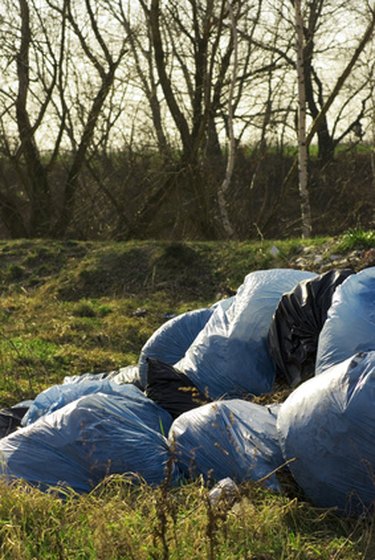
According to the website "Redefining Progress," humans are currently exceeding the Earth's limits by 39 percent. The earth has a limited quantity of resources it can provide, and humanity's global footprint is surpassing it. The effects of our global footprint on the earth are already notable, and the situation will only worsen in the years to come as our global footprint increases and the effects become more obvious.
Depletion of Natural Resources
Video of the Day
Natural resources refer to substances found on the Earth that we use to benefit our daily lives, such as oil. Most of our natural resources are vanishing at an alarming rate. Oil consumption rates rise every year. Currently, humanity consumes around 85 million barrels of oil everyday. According to a study completed by the International Energy Agency, by 2030 that amount will rise to 113 barrels a day. The problem is, the Earth only has so much of any natural resource, which means each one will eventually be depleted.
Video of the Day
Increase in Greenhouse Gas Emissions
Greenhouse gases are gases released into the atmosphere either naturally or through human intervention that traps heat. The fragile balance of natural greenhouses gases plays a factor in the overall climate on earth. Too many human-caused greenhouse gases may lead to global warming. There are three types of greenhouse gases released by human activities. Methane is released in to the environment when oil, natural gas, and coal are produced and by decaying landfill waste. Nitrous oxide is released into the environment by industrial plants and vehicles. Fluorinated gases are synthetic gases released into the environment by industrial facilities. According to the Environmental Protection Agency (EPA), many greenhouse gas levels are expected to rise in the future.
Depletion of Water Sources
Despite the Earth being practically covered by water, very little of it is actually usable. Our global footprint threatens the water resources humanity can use. Pollution of streams and rivers can go as far as ruining the entire water source. Major oil spills and industrial runoff can render a water source unsuitable for human consumption. An increase in population also leads to water decrease. As humanity expands, more water sources are needed to hydrate the population and to provide watering for livestock and agricultural lands to feed the increased population.
Poor Air Quality
Pollution and a decrease of trees and plant life have a negative impact on the Earth's air quality. Industrial plants, boating equipment, and personal vehicles all release gases into the air that are harmful for both the environment and humans. Air quality also suffers because of human expansion. As more agricultural lands are needed to meet the demands of humanity, forests and plant life are cut down to make room for the needed growth. Since trees and plants work to provide clean air for the environment, reducing their numbers leads to poorer air quality.